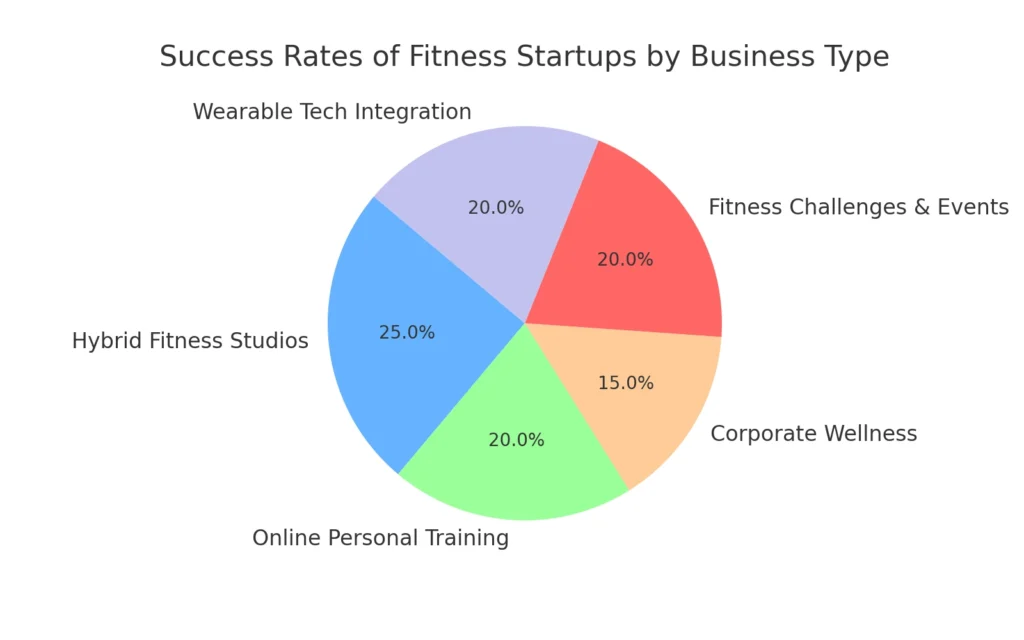The fitness industry is thriving like never before, fueled by an increasing focus on health, wellness, and personal growth. People are more invested in achieving their fitness goals, seeking personalized workout routines, and finding convenient ways to stay healthy. This has opened up new business opportunities for entrepreneurs eager to tap into this growing market. Whether it’s online personal training, fitness app development, or niche fitness studios, there is an idea to fit every passion and business model.
Starting a fitness or personal training business offers both flexibility and scalability. With diverse customer segments—from busy professionals to fitness enthusiasts—there is constant demand for innovative services. This article explores the top 10 ideas to help you launch a successful fitness startup and ride the wave of health-conscious consumers.
Why Choose Fitness and Personal Training Business?
The fitness industry is booming, driven by a growing awareness of the importance of physical and mental well-being. More people are adopting active lifestyles, and this shift has accelerated demand for personalized training and wellness solutions. Fitness businesses cater to a broad range of consumers, from beginners looking for basic guidance to athletes seeking specialized coaching. The flexibility to offer services both online and offline makes this industry appealing for entrepreneurs looking to enter a market with vast growth potential.
Today, trends like remote coaching, hybrid fitness models, and mobile personal training have emerged, giving businesses the opportunity to reach clients wherever they are. In a world that demands convenience, personal trainers and fitness startups are moving beyond traditional gym settings. Consumers are eager for tailored solutions such as virtual coaching, fitness apps, or even nutrition plans that complement workout routines.
For aspiring entrepreneurs, the fitness business offers multiple streams of income—from memberships and one-on-one sessions to online subscriptions and merchandise sales. With relatively low startup costs and the option to start small, fitness and personal training ventures are among the most scalable businesses today.

Current Trends and Future Opportunities in Fitness and Personal Training
The fitness industry is evolving rapidly, with new trends reshaping how businesses operate and engage with clients. One of the most significant shifts is the rise of hybrid fitness models—a combination of in-person and virtual training sessions. This approach offers flexibility, allowing clients to switch between physical classes and online workouts based on their convenience. It’s becoming a standard model for many personal trainers and gyms.
Another growing trend is wearable fitness technology. Devices such as smartwatches and fitness trackers provide real-time insights into activity levels, heart rate, and sleep patterns. Fitness businesses that integrate these tools into their services offer personalized coaching based on data, which enhances client satisfaction and engagement.
Specialized fitness programs targeting niche audiences are also gaining momentum. From prenatal yoga to strength training for seniors, these programs cater to specific needs, setting businesses apart from generalized fitness services. This targeted approach helps attract loyal clients seeking tailored solutions.
Mirando hacia el futuro, AI-powered fitness coaching and virtual reality workouts are expected to further transform the industry. These technologies make fitness more immersive and accessible, attracting a new generation of digital-savvy customers.
One exciting development in the industry is the rise of wearable fitness technology. Devices like smartwatches and fitness trackers provide real-time data, helping users monitor their workouts and overall health. Fitness businesses that integrate these technologies can offer personalized coaching and data-driven insights, giving them a competitive edge in the market.
| Tendencia/Tecnología | Descripción | Impacto en el crecimiento empresarial | Customer Engagement |
|---|---|---|---|
| Hybrid Fitness Models | A mix of in-person and online training options | Increases flexibility and market reach | High, as clients enjoy personalized options |
| Wearable Fitness Technology | Smartwatches and trackers providing real-time data | Enhances service offerings with insights | Strong, due to personalized progress tracking |
| Specialized Fitness Programs | Niche programs like prenatal yoga and senior fitness | Attracts targeted client groups | Builds loyalty by meeting specific needs |
| AI-Powered Coaching | Automated coaching with personalized programs | Reduces operational costs while scaling up | Engages clients with tailored feedback |
| Virtual Reality Workouts | Immersive workouts through VR environments | Creates unique experiences for new clients | High, especially among tech-savvy users |
Las 10 mejores ideas para empresas emergentes de fitness y entrenamiento personal
Starting a fitness or personal training business today offers endless possibilities. Here are ten innovative ideas that cater to the diverse needs of fitness enthusiasts and align with current industry trends.
| Idea de negocio | Costo de puesta en marcha | Mercado objetivo | Potencial de ganancias |
|---|---|---|---|
| Online Personal Training | Bajo | Profesionales ocupados, trabajadores remotos | High (Scalable with low overhead) |
| Mobile Fitness Classes | Medio | Groups, corporate clients | Moderado a alto |
| Fitness App Development | Alto | Tech-savvy fitness enthusiasts | High (With subscription potential) |
| Specialized Fitness Studios | Alto | Enthusiasts with niche preferences | High (Dependent on demand) |
| Hybrid Fitness Training | Medio | Clients with unpredictable schedules | High (Flexible revenue streams) |
| Nutrition Coaching Services | Bajo | Wellness-focused individuals | Moderate (Can complement fitness) |
| Programas de bienestar corporativo | Medio | Businesses and organizations | High (With recurring contracts) |
| Fitness Challenges & Bootcamps | Bajo | Group fitness lovers | Moderate (Short-term engagements) |
| Wearable Tech Integration | Medio | Tech enthusiasts and gadget users | High (Unique service offering) |
| Fitness Merchandise Store | Alto | Athletes, fitness enthusiasts | High (Supplementary revenue) |
1. Online Personal Training
Offer one-on-one virtual training through video calls. This model allows clients to receive personalized coaching without leaving their homes.
- Startup Needs: Video conferencing software, certifications
- Mercado objetivo: Profesionales ocupados, trabajadores remotos
- Estimated Startup Cost: Bajo
2. Mobile Fitness Classes
Bring workouts to clients in parks, homes, or offices. This model offers flexibility and eliminates the need for a physical gym.
- Startup Needs: Fitness equipment, transportation
- Mercado objetivo: Groups and corporate clients
- Estimated Startup Cost: Medio
3. Fitness App Development
Create a fitness app offering workout plans, progress tracking, and reminders. The app can cater to specific fitness goals, such as weight loss or muscle gain.
- Startup Needs: App developers, fitness expertise
- Mercado objetivo: Tech-savvy fitness enthusiasts
- Estimated Startup Cost: Alto
4. Specialized Fitness Studios
Open a studio that focuses on a niche, such as yoga, Pilates, or CrossFit. Niche studios attract dedicated clients looking for specialized services.
- Startup Needs: Studio space, specialized equipment
- Mercado objetivo: Fitness enthusiasts with niche preferences
- Estimated Startup Cost: Alto
5. Hybrid Fitness Training
Combine online and offline training, giving clients the flexibility to switch between home and in-person sessions based on their convenience.
- Startup Needs: Online platform, physical space
- Mercado objetivo: Individuals with unpredictable schedules
- Estimated Startup Cost: Medio
6. Nutrition Coaching Services
Offer dietary guidance alongside fitness programs. Combining fitness and nutrition creates holistic solutions for better results.
- Startup Needs: Nutrition certifications, coaching tools
- Mercado objetivo: Clients seeking complete wellness solutions
- Estimated Startup Cost: Bajo
7. Corporate Wellness Programs
Provide fitness and wellness services to businesses. Programs can include fitness challenges, stress management, and group workouts.
- Startup Needs: Corporate partnerships, trainers
- Mercado objetivo: Businesses looking to boost employee wellness
- Estimated Startup Cost: Medio
8. Fitness Challenges and Bootcamps
Organize short-term fitness events focused on specific goals, such as weight loss or endurance. Bootcamps engage clients with structured programs.
- Startup Needs: Event space, trainers
- Mercado objetivo: Fitness enthusiasts who enjoy group activities
- Estimated Startup Cost: Bajo
9. Wearable Tech Integration
Develop services that integrate with wearable technology, offering insights and tracking to enhance fitness routines.
- Startup Needs: Partnerships with tech providers
- Mercado objetivo: Gadget lovers and fitness trackers
- Estimated Startup Cost: Medio
10. Fitness Merchandise Store
Sell fitness-related merchandise such as branded clothing, supplements, or equipment. This model can be combined with other fitness services for additional revenue.
- Startup Needs: Inventory, e-commerce platform
- Mercado objetivo: Fitness enthusiasts and athletes
- Estimated Startup Cost: Alto
Creando una fitness app offers a powerful way to engage tech-savvy clients. With features like workout plans, virtual classes, and progress tracking, these apps make fitness accessible and convenient. Entrepreneurs can build subscription-based services, reaching clients anywhere and offering tailored solutions for specific fitness goals.
Ejemplos del mundo real
Successful fitness startups often share common qualities: they understand customer needs, leverage technology, and build strong communities. Here are some examples of business models that have flourished in today’s competitive fitness industry:

- Hybrid Fitness Studios – Businesses combining physical gyms with online classes have gained popularity. These studios offer members flexibility, allowing them to train both in-person and from home. This model caters to changing schedules and consumer demand for convenience.
- Online Personal Training Platforms – Platforms offering remote personal training have seen rapid growth. Trainers use apps or websites to deliver customized programs, and clients receive real-time coaching via video sessions. This setup has allowed trainers to scale their businesses beyond geographical limitations.
- Programas de bienestar corporativo – Some startups specialize in providing wellness services to companies, including fitness sessions and mental health support. This model has become crucial, especially as businesses focus more on employee well-being.
- Fitness Challenges and Events – Short-term events like bootcamps, step challenges, or weight loss competitions engage clients with specific goals. These programs create a sense of achievement and community, keeping participants motivated.
- Wearable Tech Integration with Coaching – Startups integrating wearable technology into their services have also thrived. By using fitness trackers, they offer data-driven training that enhances user experience and keeps clients engaged.
Mistakes to Avoid When Starting a Fitness or Personal Training Business
Starting a fitness business can be highly rewarding, but it comes with challenges. Many startups fail because they overlook key aspects of the industry. To succeed, here are some common mistakes to avoid:
1. Skipping Market Research
One of the biggest mistakes new fitness entrepreneurs make is neglecting proper market research. Before launching your business, it’s essential to understand your target audience and local competition. Without this, you risk offering services that may not resonate with potential clients or entering an oversaturated market.
2. Underestimating the Importance of Certifications
Credibility is everything in the fitness world. Failing to obtain proper certifications can undermine your reputation and limit your business’s growth. Clients look for qualified professionals who they can trust to guide them safely through their fitness journey.
3. Ignoring Client Retention Strategies
While acquiring new clients is important, retaining them is equally crucial for long-term success. Many fitness businesses focus heavily on marketing to attract new customers but fail to build loyalty programs or personalized experiences that keep clients coming back.
4. Poor Financial Planning
Many fitness businesses struggle because of weak financial planning. Startups often underestimate their operational costs, from equipment maintenance to marketing. It’s vital to have a clear budget and anticipate ongoing expenses to ensure smooth operations.
5. Neglecting Online Presence
In today’s digital era, having a strong online presence is non-negotiable. Failing to create a user-friendly website or engaging social media accounts can severely limit your reach. Whether you’re offering in-person or virtual services, your digital footprint is how clients discover and engage with your business.
| Errores comunes | Impacto en los negocios | Medidas preventivas |
|---|---|---|
| Saltarse la investigación de mercado | Launching irrelevant services, lost customers | Conduct thorough market research to understand trends and audience needs |
| Lack of Proper Certifications | Reduced credibility, fewer clients | Obtain recognized fitness certifications to build trust |
| Ignoring Client Retention Strategies | High churn rate, unstable revenue | Develop loyalty programs and personalized experiences to retain clients |
| Mala planificación financiera | Running out of funds, operational disruptions | Create a detailed budget and track expenses carefully |
| Neglecting Online Presence | Limited reach, fewer leads and engagement | Build an active online presence with a website and social media profiles |
¿Por qué confiar en Miracuves Solutions para su próximo proyecto?
When it comes to launching or expanding a fitness business, choosing the right technology partner can make all the difference. Miracuves Solutions offers expertise in crafting innovative, user-friendly apps and platforms tailored specifically to the fitness industry. Whether you need a mobile fitness app, an online personal training portal, or a subscription-based fitness service, Miracuves ensures a seamless digital experience that helps you stay ahead of the competition.
One of the standout benefits of working with Miracuves is speed and affordability. With development times 30 times faster than the industry average and costs just 10% of the global market rate, your business can launch quickly without compromising quality. This efficiency allows you to focus on what matters most—growing your brand and delivering exceptional services to your clients.
Miracuves Solutions also provides scalable technology that evolves with your business. Whether you’re starting small or planning to expand into new markets, their platforms grow alongside you. With a proven track record of helping startups succeed, Miracuves ensures that your project is built for long-term success.
From concept to execution, Miracuves Solutions offers end-to-end support, empowering your fitness business with the technology it needs to thrive in a fast-moving market.
Conclusión
The fitness and personal training industry offers endless opportunities for passionate entrepreneurs. Whether through online personal training, wearable tech integration, or niche fitness studios, there are numerous ways to create a profitable business. With the growing demand for health and wellness, businesses that adapt to emerging trends like hybrid training models or AI-powered coaching are positioned to thrive.
Building a fitness startup isn’t just about offering workouts; it’s about creating meaningful connections with clients, staying ahead of industry trends, and delivering exceptional value. By choosing the right idea and implementing thoughtful strategies, entrepreneurs can develop businesses that inspire and empower others on their fitness journey. With the right technology and dedication, success in this industry is well within reach.
Preguntas frecuentes
How much does it cost to start a personal training business?
The startup cost varies depending on the business model. Online personal training requires minimal investment, while opening a studio demands more for rent, equipment, and marketing. On average, costs can range from $2,000 to $50,000.
What qualifications are needed to become a personal trainer?
A recognized certification, such as personal training or fitness coaching, is essential. It ensures credibility and provides the necessary knowledge to train clients effectively and safely.
How do I attract clients to my fitness business?
Offering free trials, promoting your services on social media, and building a strong referral network are effective strategies. Personalizing services based on individual goals also helps in attracting and retaining clients.
What technologies can help my fitness business grow?
Fitness apps, virtual training platforms, and wearable tech are great tools to enhance client engagement. Leveraging these technologies allows businesses to offer personalized services and track client progress effectively.
How do I stand out in the competitive fitness industry?
Focusing on a niche market, providing exceptional customer service, and staying updated with the latest fitness trends will help your business stand out. Building a community around your brand also fosters loyalty among clients.





























































